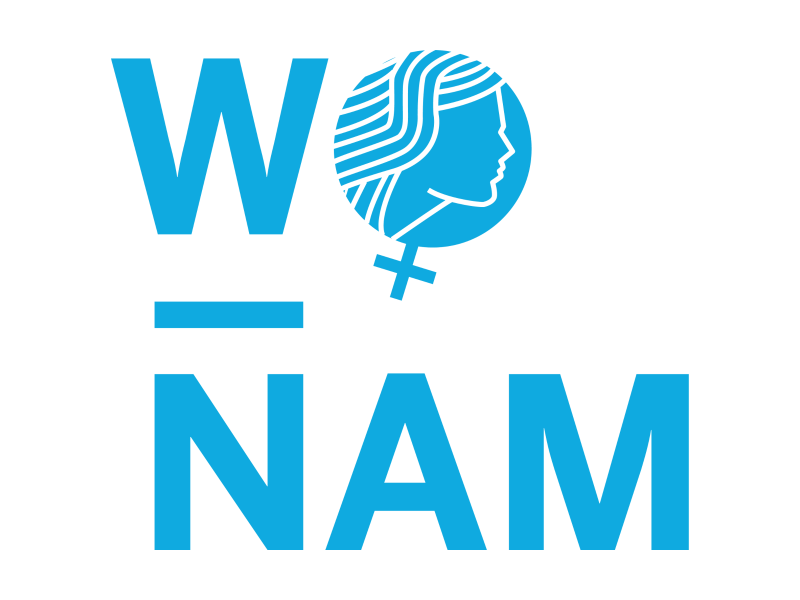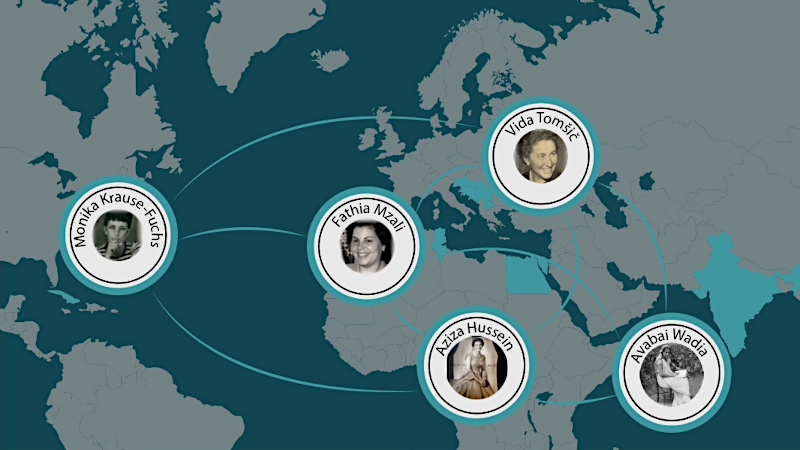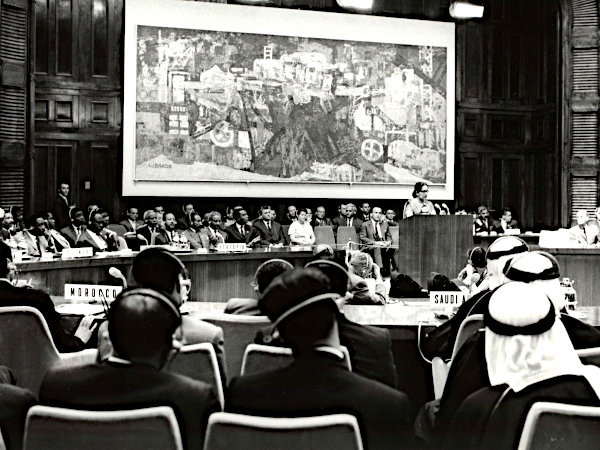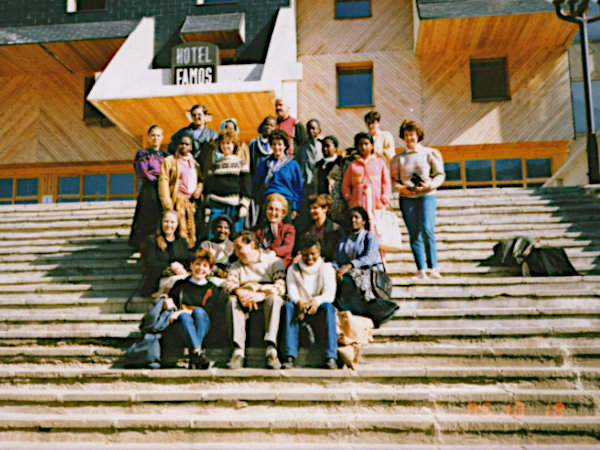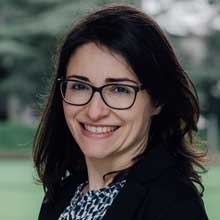WO-NAM
Women and Non-Alignment in the Cold War era: biographical and intersectional perspectives
About
WO-NAM will provide crucial insights into the history of women’s participation in the Non-Aligned Movement during the Cold War era, studying the roles of female leaders, women’s movements and women’s organizations. It will redefine existing interpretations of Cold War history and historiography by conducting groundbreaking research on the significance of Non-Aligned networks in shaping transnational debates on women’s rights within international institutions.
Bringing together women’s and gender history, global history, and intellectual history, the project will answer the following research questions:
- What was the role of female activists and leaders within the Non-Aligned Movement?
- How did women’s organizations contribute to nation-building, modernization, and development in their respective Non-Aligned countries?
- What was the significance of the Non-Aligned Movement in transnational Cold War debates on women’s rights before and during the UN Decade for Women (1975-1985)?
- How did women’s internationalism within the Non-Aligned Movement contribute to an intersectional vision of women’s rights, which viewed women’s oppression as inseparable from wider global inequalities?
WO-NAM will have four research strands:
- female leaders and activists’ biographies
- grassroots and state-sponsored women’s organizations
- international conferences at UN and NAM level
- transnational knowledge production
Bringing together women’s and gender history, global history, and intellectual history, the project relies on biographical and intersectional methods to explore the significance of women’s internationalism. WO-NAM will draw on rich and diverse archival collections on women’s activism in its focus on the case studies of Yugoslavia, Egypt, Tunisia, India, and Cuba. The project also includes a survey of existing archival collections on women’s internationalism in Western Europe and the United States, and the creation of a data-base with new digital resources (documents, biographies, maps, oral history interviews).
Research
The Non-Aligned Movement (NAM) began in 1961 at a summit in Belgrade as an alliance of newly decolonized, developing countries, who advocated an end to bipolar bloc divisions and supported national self-determination and peaceful coexistence, particularly through a stronger role for the United Nations and its agencies. Still in existence, although lacking the influence it had during the Cold War period, it is one of the longest-running and largest international organizations. In existing scholarly research and in everyday culture, the NAM is generally presented as the prerogative of male leaders engaged in high-level diplomacy, as exemplified by the iconic picture of Tito, Nasser, and Nehru – considered the “founding fathers” of the NAM – together with Sukarno and Nkrumah.
Would we obtain a different picture, however, if we were to consider Non-Aligned interactions and encounters from the perspective of female leaders, state-sponsored women’s organizations, and grassroots women’s movements, given that both the NAM and the transnational women’s movement shared similar values in terms of international solidarity and socioeconomic justice and empowerment? What if we could understand discussions over women’s emancipation as having been an intrinsic component of broader utopian imaginaries of decolonization, development, and modernization?
During the Cold War, female leaders from different developing countries, such as Indira Gandhi, Sirimavo Bandaranaike, Vilma Castro Espín, and Vida Tomšič came to the fore as international actors. As a result of cross-border solidarity initiatives between the NAM countries, female journalists, experts, technicians, artists, and students, as well as administrators and politicians traveled between the Global East and the Global South not only to improve their education and career perspectives but also to express their political convictions and share expertise. Up until the Yugoslav breakup, socialist Yugoslavia was a key site of women’s transnational encounters. One example was the UNFPA-sponsored seminar on planned parenthood for women from Asia, Africa, Latin America, and the Middle East, organized at the University of Sarajevo between 1986 and 1991 by Dr. Nevenka Petrić, a Serbian Partisan, poet, scholar, and reproductive rights activist.
By focusing on East-South and South-South women’s encounters and debates, WO-NAM will provide crucial insights into the history of women’s participation in the Non-Aligned Movement in the Cold War era, fundamentally revising and revitalizing existing interpretations of Cold War history and historiography.
Taking Non-Aligned women’s networks as a vantage point, WO-NAM will be the first project to address how female leaders and activists from the Global East and the Global South intervened in a variety of international institutions that were part of, or affiliated to, the United Nations, in order to shape ongoing debates on women’s rights, family planning, and development. To achieve its goals, the project will focus on the biographies of key activists based in Yugoslavia, Egypt, Tunisia, India, and Cuba, whose engagements at the national and international level permits a transnational comparison. Alongside biographical and autobiographical writings, the project will explore the personal archival collections left by many of these pioneers in their respective countries. The key figures that the project studies were simultaneously active in different transnational arenas, notably the UN conferences on women held in Mexico City (1975), Copenhagen (1980), and Nairobi (1985) during the UN Decade for Women, as well as expert meetings promoted by countries affiliated to the NAM on the issue of women in development. Transnational debates on family planning will also be examined as well as cross-border encounters within NGOs such as the International Planned Parenthood Federation (IPPF), founded in 1952, which had a consultative status at the UN and played a major role in global population debates in the 1960s and 1970s.
The biographies of the key figures selected for the project can be defined as ‘Non-Aligned’ not only since women’s activism unfolded in countries belonging to the NAM, but also because their engagement did not always ‘align’ with a predefined socialist or feminist agenda, or with existing national or international politics, despite occurring in institutional settings. Pioneering female leaders were active in several arenas simultaneously, working as intermediaries between nation-based, state-sponsored women’s organizations, and international institutions.
Thanks to its international and interdisciplinary team of experts with combined expertise in women’s and gender history, global history, and intellectual history, WO-NAM will provide the first long-term history of women’s Non-Aligned activism, placing the agency of female leaders, women’s movements, and women’s organizations from the Global South and from Yugoslavia at its center.
WO-NAM includes two groundbreaking aspects:
- the concept of intersectionality will be applied systematically to the analysis of transnational women’s history in the Non-Aligned countries – particularly to the study of individual biographies, women’s organizations, international women’s conferences, and transnational knowledge production;
- the project will highlight how Non-Aligned debates over gender and development in the Global South can be taken as precursors to the concept of intersectionality.
Activities
2026
- 8-11 January 2026: Sarah Nagaty's participation in the AHA - American Historical Association, 139th Annual Meeting, Chicago, with the paper Arwa Salih’s Memoirs: The Intimate History of the Egyptian Students’ Movement (Big Berks Panel: AHA Panel-Law, the State, Nationality, and Well-being).
2025
- 16-17 October 2025: Participation in international conference “Tensions and Interactions Between the UN Conferences on Women and the Planetary Growth of Feminism: Mexico City 1975, Nairobi 1985, Beijing 1995... and Beyond”, University of Bologna — presentations by Chiara Bonfiglioli, Giulio Fugazzotto, Albert Manke, Bruno Walter Renato Toscano.
- 25-27 September 2025: Preparatory Group Member, Chair & Comment, international conference organised by the International Conference of Labour and Social History (ITH), “Workers and Worldmaking: Labour in the Era of Decolonisation”, Linz, Austria — Shivangi Jaiswal.
- 25-27 September 2025: Participation in “60th International Conference of Labour and Social History conference Workers and Worldmaking: Labor in the Era of Decolonization”, University of Linz (Austria), with paper presentation by Albert Manke, “Experiences and Impact of Women Workers in Feminist Networks Between Cuba, the NAM and the Socialist Bloc during the Cold War.”
- 18-20 September 2025: Participation in the “VII International Conference Socialism on the Bench” dedicated to the Non-Aligned Movement. Conference in Pula — whole team and Chiara Bonfiglioli keynote speaker.
- 11-13 September 2025: Participation in “XIII Cantieri di Storia” Conference with a panel entitled “Sviluppo, sicurezza, diritti delle donne: il dibattito internazionale sulle politiche di popolazione fra guerra fredda e decolonizzazione” (Development, Security, and Women’s Rights: The International Debate on Population Policies between the Cold War and Decolonization). Conference in Pisa organized by the Italian Association on Contemporary History (SISSCO) — panel presented by Bruno Walter Renato Toscano.
- 1-2 September 2025: Participation in congress “Mujeres y Poder: Género, ideas, espacios y prácticas políticas desde los feminismos y al Segundo Encuentro de Académicas Feministas” in Toluca, Mexico, with paper presentation by Albert Manke, “Mujeres en la Cuba revolucionaria: Activismo político, interseccionalidad e internacionalismo durante la Guerra Fría y más allá”.
- 20-22 August 2025: Participation in the international colloquium “Construyendo sociedades inclusivas en América Latina y el Caribe”, Universidad Nacional de Costa Rica, San José (Costa Rica), with paper presentation by Albert Manke, “Construyendo sociedades más incluyentes: Mujeres en la Cuba revolucionaria y su colaboración internacionalista.”
- 30 June-4 July 2025: Participation in the international congress “150 AÑOS de ICA – NUEVOS DESAFÍOS, NUEVOS ESPACIOS”, University of Novi Sad, Serbia, with paper presentation by Albert Manke, “Colaboración feminista y transferencias de conocimiento entre Cuba y Europa del Este durante la Guerra Fría.”
- 26-27 June 2025: “Women’s internationalism and anti-imperialism in the 20th century: from the interwar to the Cold War period”, Combo, Campo dei Gesuiti 4878, Venice
- 18-20 June 2025: Participation in the “Race and Sexual and Reproductive Health in Historical Perspectives” Conference with a paper entitled “'In Search of the Path: the Pathfinder Fund, the Global South and the Fieldworkers Who Shaped the Population Control Movement (1952-1965).” Conference in Geneva organized by the Re:share Team and the Geneva Graduate Institute — paper presented by Bruno Walter Renato Toscano.
- 5-6 June 2025: Participation in the international conference The Twilight of Internationalism at Scuola Normale Superiore di Pisa, with paper presentation by Chiara Bonfiglioli, “Between Nairobi and Beijing: reconfigurations of Women's Internationalism at the end of the Cold War.”
- 30 May 2025: Chiara Bonfiglioli’s participation as discussant in the international workshop “A Non-Aligned Space of Cooperation: History, Legacy, Entanglements”, University of Padova.
- 23-26 May 2025: Participation in the international “LASA 2025 Congress Poner el cuerpo en Latinx América”, San Francisco, CA (USA), with paper presentation by Albert Manke, “From Cuba to the World: Transnational Feminist Activism and the Non-Aligned Movement during the Cold War”, panel “Feminism in Activism and Artivism.”
- 22 April 2025: Chiara Bonfiglioli’s lecture in Ljubljana: ‘“Drage deklete…Vida Tomšič and the archival traces of partisan women’s comradeship in fascist jails”. International workshop Socialisation of Partisan Archive (FDV and ZRC SAZU), 22-23 April 2025.
- 20-26 April 2025: Participation in the “15th European Social Science History Conference” with a panel entitled “Women’s Anti-Imperialist Activism Within and Beyond the WIDF: Women’s Organization in France, Tunisia, Yugoslavia and the United States During the Cold War”, conference in Leiden — Chiara Bonfiglioli and Bruno Walter Renato Toscano.
- 14-15 April 2025: Presentation of “Socialism Goes Global: The Soviet Union and Eastern Europe in the Age of Decolonisation” (University of Cambridge Press, 2022) and “Off White: Central and Eastern Europe and the Global History of Race” (Manchester University Press, 2024), with James Mark.
- 6-7 April 2025: Participation in “Women’s Private Archives Workshop” at the American University of Cairo and Women and Memory Forum — Cairo, Egypt — Sarah Nagaty.
- 4 April 2025: “The New Balkan Left and the student movement in Serbia: global challenges and regional realities,” with Igor Štiks.
- 28 March 2025: participation in “European Social Science History Conference,” panel title “Women's anti-Imperialist activism within and beyond the WIDF: women’s organizations in France, Tunisia, Yugoslavia and the United States during the Cold War (1945-1989)”, University of Leiden - Chiara Bonfiglioli and Bruno Walter Renato Toscano.
- 7-8 March 2025: paper presentation, international workshop “Transnational Training, Education and Knowledge Exchange in Revolutionary Cuba”, University of Cambridge, UK - Albert Manke.
- 20-21 February 2025: keynote speech, Chiara Bonfiglioli, "Left-Wing Women's Organizing and Activism in the Twentieth Century” conference in Rome.
- 20-21 February 2025: participation in “Left-Wing Women's Organizing and Activism in the Twentieth Century” with a panel entitled “Intersectional Frictions: Women’s Agency within Left-Wing Movements in India, Cuba, Egypt, and the United States (1940s-1980s)”, conference in Rome - whole team.
- 7-8 February 2025: Shivangi Jaiswal's participation in the workshop, “Rethinking the Trajectory: From Women’s Archives to Feminist Archiving”, 7th and 8th February 2025, Savitribai Phule Pune University, Pune, India.
2024
- 4 October 2024: “Women and Non-Alignment in the Cold War Era: biographical and intersectional perspectives,” presentation of the project at Centre for Cultural and Historical Research of Socialism (CKPIS), University of Pula (Croatia) - whole team.
- 30 September 2024: “The Greatest Feminist Who Didn’t Know She Was One: Women’s Archives, Oral Histories, and the Challenge of Feminist Subjectivity”, University College Cork - PI.
- 19-22 June 2024: “Gender and History Beyond Boundaries”. IX Congress of the Società Italiana delle Storiche, University of Palermo, panel “Approcci intersezionali e globali alla storia dei diritti riproduttivi durante la Guerra Fredda”, coordinated by Chiara Bonfiglioli and Bruno Walter Renato Toscano. Speakers: Maud Anne Bracke (University of Glasgow), Chiara Bonfiglioli, Bruno Walter Renato Toscano, discussant Alessio Ponzio (University of Saskatchewan).
- 27-28 May 2024: international conference: “Turning the map upside down Connected Histories of Decolonization, Third Worldism, and Radical Activism”, University of Turin. Papers by Chiara Bonfiglioli on “Anti-Malthusianism Between Yugoslavia and the Global South: Reproductive Rights from a Non-Aligned Perspective” and Bruno Walter Renato Toscano on “The Enduring ’68: Women of Colour, Thirdworldism and U.S. Solidarity with Global South”.
- 21 May 2024: online workshop on the New International Economic Order, CAS Rijeka, organized by Paul Stubbs, with papers by Chiara Bonfiglioli, Anna Calori, Sue Onslow, and Sam Nicholls.
- 15-17 May 2024: international conference “Postcolonial, Decolonial, Postimperial, Deimperial”, organized by Jeremy Walton at the University of Rijeka. Paper by Chiara Bonfiglioli on “Women’s Non-Aligned encounters: internationalist dialogues during the Cold War”.
- 14 May 2024: seminar “Kristen R. Ghodsee: From Notes to Narrative. Seminario per laureandi e dottorandi sulla scrittura etnografica” - Malcanton Marcorà (Sala Geymonat). With intervention by Kristen R. Ghodsee (University of Pennsylvania). In dialogue with Matteo Benussi and Chiara Bonfiglioli.
- 13 May 2024: Lectio Magistralis “Valchirie Rosse: Lezioni Femministe da 5 Donne Rivoluzionarie Dimenticate” - Ca’ Bernardo (Sala B). With Intervention by Kristen R. Ghodsee (University of Pennsylvania), presenting the volume “Valchirie Rosse: Le rivoluzionarie dell’Est Europa” (2024). In dialogue with Chiara Bonfiglioli, Duccio Basosi and Bruno Walter Renato Toscano.
- 18 April 2024: international workshop on Communist autobiographies, organized by Paolo Capuzzo at the University of Bologna. Paper by Chiara Bonfiglioli on "Pioneers of women's economic development: the biographical narratives of Devaki Jain and Vina Mazumdar".
- 5 April 2024: annual conference of the British Association for Slavonic and East European Studies (BASEES) 2024. Roundtable “Wither internationalism? Decolonisation narratives and the (im)possibility of supranational feminist, socialist, and pacifist solidarities”. Chaired by Kristen Ghodsee (University of Pennsylvania), with interventions by Chiara Bonfiglioli, Agnieszka Mrozkik (Polish Academy of Sciences) and Adriana Zaharijević (University of Belgrade).
- 5-6 March 2024: seminar “Femminismo, comunismo e antifascismo negli anni Venti e Trenta del Novecento” - Malcalton Marcorà (Sala Milone), Ca’ Foscari University of Venice. With interventions by Dr. Daria Dyakonova (International Institute in Geneva; “La Sapienza” University of Rome), presenting the volume “The Communist Women’s Movement, 1920-1922. Proceedings, Resolutions, and Reports” (2023), and by Dr. Isidora Grubački (Institute of Contemporary History, Ljubljana), on ”New feminism” and antifascism in the 1930s: the Women’s World Committee against War and Fascism from the Yugoslav perspective. In dialogue with Chiara Bonfiglioli, Bruno Walter Renato Toscano and Minja Bujaković (EUI).
2023
- 29 November-4 December 2023: annual convention of the Association for Slavic, East European, & Eurasian Studies (ASEEES), paper by Chiara Bonfiglioli on “'Updating Malthus' Population Theory Is Out of the Question Today': Nevenka Petrić and Non-Aligned Alliances against Neo-Malthusianism” within the panel “Yugoslav Non-Aligned Encounters in the Global South III: Development Policies”.
Team
Chiara Bonfiglioli
Principal Investigator
She is Associate Professor of Contemporary History at Ca' Foscari University of Venice. She previously taught Gender and Women’s Studies at University College Cork, where she coordinated the one year interdisciplinary Masters in Women’s Studies. She is the author of “Women and Industry in the Balkans: The Rise and Fall of the Yugoslav Textile Sector” (I.B. Tauris, 2019).
Giulio Fugazzotto
Giulio Fugazzotto is a postdoctoral research fellow at the Department of Humanities, Ca’ Foscari University of Venice, where he is conducting research in global and transnational history on women's and feminist movements in Tunisia from the post-World War II period until the late 1980s. In 2024, he obtained a PhD in Contemporary History and Comparative Cultures at the University of Urbino Carlo Bo, with a dissertation entitled “Al servizio di una rivoluzione globale? I comunisti italiani e il colonialismo (1926-1956)” ("At the Service of a Global Revolution? Italian Communists and Colonialism (1926-1956)"). Since 2024, he has been participating in the oral history project “La Raccolta di videointerviste della Fondazione Gramsci Emilia-Romagna” ("The Collection of Video Interviews of the Fondazione Gramsci Emilia-Romagna") dedicated to recording interviews with former militants of the PCI, FGCI, and CGIL in the Bologna area. Since 2022, he has been a member of the editorial board of “Zapruder. Rivista di storia della conflittualità sociale” ("Zapruder. Journal of Social Conflict History").
Shivangi Jaiswal
Shivangi Jaiswal is a postdoctoral Research Fellow at the Department of Humanities, Ca’ Foscari University of Venice. She is a historian with research interests in social and economic history of modern India, labour history, oral history, and history of ideas. She holds a PhD in History from Jawaharlal Nehru University, India, with a thesis titled “Representing Labour: Dalits, Workers, and the State in India, 1942-52”. She was awarded Erasmus+ scholarship for a PhD exchange at the University of Göttingen, Germany, and the Charles Wallace India Trust Research Grant in the UK. As a Research Associate, she has previously worked with the Association of Indian Labour Historians, V.V. Giri National Labour Institute, Transnational Research Group (Poverty and Education) under the AIIS-GHIL Delhi Program. She has published in leading journals and edited volumes on labour history, oral history, and history of medicine. She has taught History, Global Politics and Theory of Knowledge in the International Baccalaureate Diploma Programme, and conducted pedagogy workshops for History for Peace, a network of educators and civil society members in India.
Albert Manke
Albert Manke is a postdoctoral research fellow at the Department of Humanities of Ca’ Foscari University of Venice and a Senior Fellow at the Institute of European Studies at the University of California, Berkeley. His professional interests follow the entangled histories of resistance, mobility, and gender in Latin America in a global context. He holds a PhD in Iberian and Latin American History from the University of Cologne and has been conducting research at academic institutions in Latin America, Europe, Asia, and the United States. He is the author of “The Cuban People in Arms: The National Revolutionary Militias and the Defense of the Cuban Revolution of 1959” (in German, 2nd ed. 2022) and “Coping with Discrimination and Exclusion: Experiences of Free Chinese Migrants in the Americas in a Transregional and Diachronic Perspective” (2021), also published in Spanish (2020).
List of publications
Sarah Nagaty
Sarah Nagaty is a Post-Doctoral Researcher at the Department of Humanities, Ca’ Foscari University of Venice. She is a cultural historian of Egypt in the 20th century with particular interest in liberation movements and social change. She is currently working on women movements in Egypt from the 1950s until the end of the Cold War in 1991. Nagaty received full-funding from the FCT (Foundation for Science and Technology, Portugal) for a joint doctoral degree in Cultural Studies from the University of Copenhagen and UCP Lisboa. She was awarded her doctoral degree in April 2023 for her thesis "The Collective Dream: Egyptian Longing for a Better Life" which was published as a book later in the same year. The Collective Dream proposes an alternative way for theorizing historical revolutionary transformations which takes into consideration experiencing political change in everyday life. Both her Bachelor degree (The University of Alexandria, Egypt) and her MA degree (The University of Sheffield, the UK) were completed with dissertations on writing political dissent in Egypt and Somalia. Nagaty led educational courses at the Library of Alexandria for the Harvard-affiliated platform edX in addition to designing and teaching her own courses for MA students in cultural theory and Arab nationalism.
Bruno Walter Renato Toscano
He is Post-Doc fellow at Ca’ Foscari University of Venice. He earned a Ph.D. in History from the University of Pisa with a dissertation in U.S. History entitled “Their struggle is our struggle”: the Third World Women’s Alliance and the Alliance Against Women’s Oppression between anti-imperialism, reproductive rights, and transnational activism (1970-1989). He is the author of the book “Pantere nere, America bianca. Storia e politica del Black Panther Party” (Ombre Corte, 2023).

